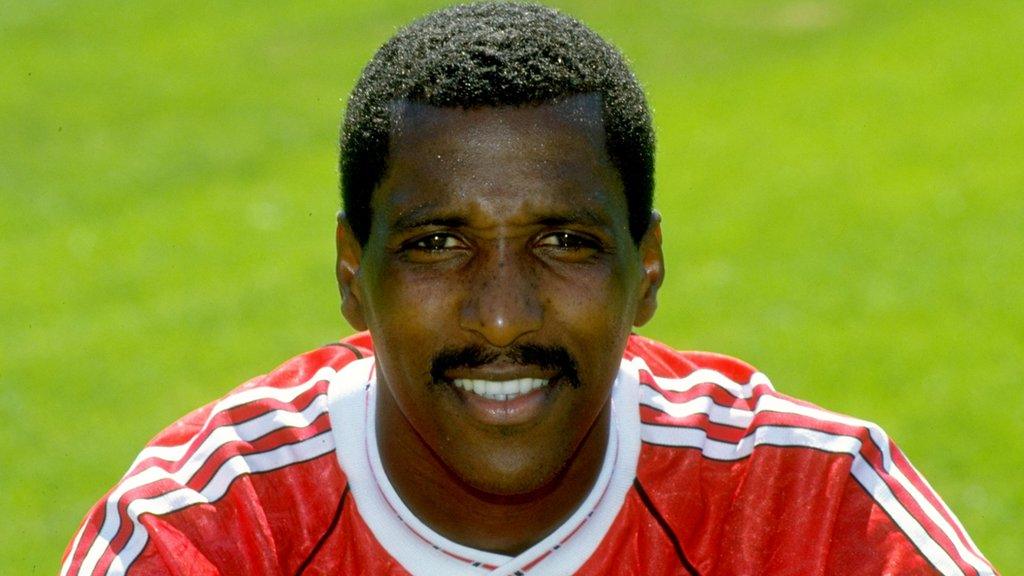Racism in football: Footballers still facing racist abuse online
- Published
- comments
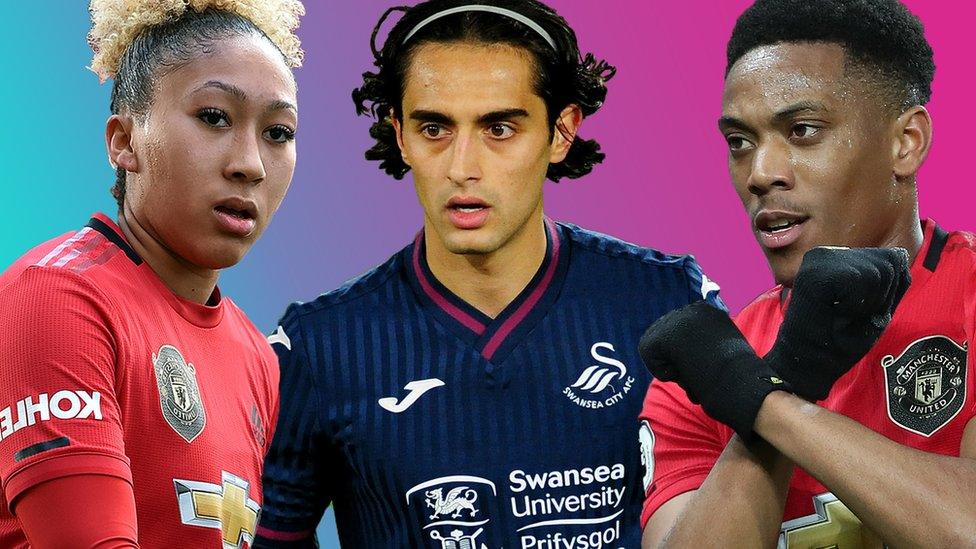
From left to right: Lauren James, Yan Dhanda and Anthony Martial. These players have all suffered racial abuse on social media recently
There have been calls for social media companies to do more to tackle racism on their platforms.
It comes after several footballers were racially abused online in recent weeks.
On Sunday, Manchester United player Anthony Martial was racially abused on Instagram after his side's 1-1 draw at West Brom.
It is the second time in three weeks that Martial has been targeted, while his club-mates Marcus Rashford, Axel Tuanzebe and Lauren James have all suffered abuse recently. Other players targeted include Chelsea players Antonio Rudiger and Reece James - the brother of United's Lauren - Swansea's Yan Dhanda, West Brom's Romaine Sawyers and young Southampton prospect Alex Jankewitz.
The social media post targeting Martial also contained a number of users tagging Instagram and calling on the platform to do something about the issue. Police have been informed of the messages.
What's the latest?
WATCH: 10-year-old Balraj talks to Charlton's Lyle Taylor about racism in the professional game (September, 2019)
Racism in football is nothing new. In the 1970s and 1980s professional black players faced severe discrimination by fans, simply because of the colour of their skin.
And nearly half a century later, racism in football is still a big problem.
In 2019, 10-year-old Balraj reported on the issue for Newsround, but unfortunately nothing seems to have changed and players are now facing more abuse on social media as fans are unable to attend matches due to coronavirus.
Incidents of racist abuse in English football are rising.
Data shows one in 10 football matches in the 2019-20 season had an incident of hate crime in England and Wales, and the number of arrests for racist or indecent chanting more than doubled from 2018-19 to 2019-20 - from 14 to 35 - even though hundreds of matches during the second half of the season were cancelled or played behind closed doors due to the pandemic.
During just the final six weeks of last season, a joint PFA and Signify study of online content identified more than 3,000 abusive messages aimed at Premier League players, 56% of which were racist. Of the players surveyed, 43% said they had experienced targeted racist abuse.
Racism is when words or actions are used to discriminate or disadvantage people because of their colour, culture or ethnic origin.
'They're adding fire to hate'
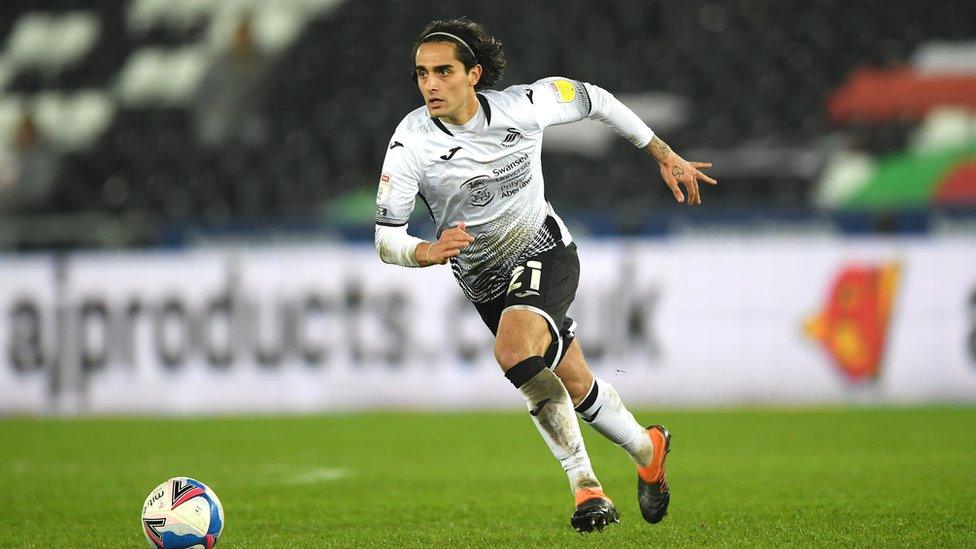
Former Liverpool youngster Yan Dhanda has scored five goals in 42 games since joining Swansea in 2018
Yan Dhanda, 22, who plays for Swansea, was racially abused on Instagram and says the lack of action taken by social media companies over online abuse is giving people "the green light to go and do it again."
"They're just adding fire to the hate and proving to the racist people they can get away with it," he said.
Facebook, which owns Instagram, said it would not ban the user who racially abused Dhanda, but have temporarily stopped the user from sending Instagram messages.
The matter was reported to South Wales Police, who are continuing investigations while Swansea have criticised Facebook's response, saying the "level of abuse that we have witnessed...means that once again we seek stronger action from social media companies in order to stamp this type of toxic behaviour out".
Facebook has not revealed how long the account will be stopped from sending messages, but said people deserve a chance to learn from their errors.
"We do not want racism and hate on our platforms," a Facebook spokesperson said.
'I'm proud of my skin, I love my skin colour'
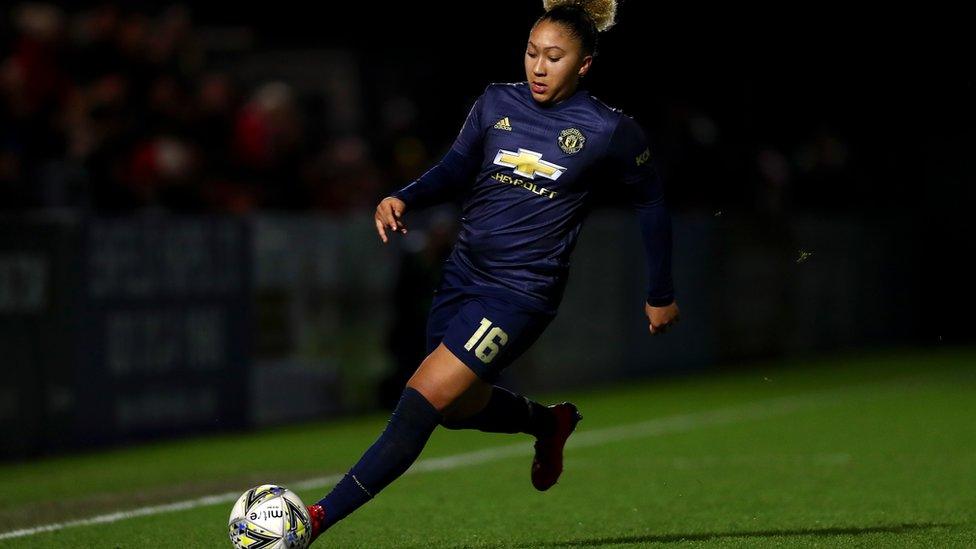
Lauren James wants social media companies to do more to prevent the racial abuse she, and several other players, have faced online
Lauren James wrote an article for The Telegraph newspaper speaking out against the racism she has recently received from anonymous social media accounts.
"I'm 19 years old and I'm sitting here, writing about racist abuse," she said. "All because of the colour of my skin. It is mad. I'm proud of my skin, I love my skin colour. But when I saw the comments on my Instagram feed, it hurt.
"For a moment, I thought I was seeing things. I thought, 'This can't be real.' It wasn't just one comment, or one emoji. The comments kept coming. I didn't know why. There wasn't a reason for the abuse."
Lauren is also urging the football community and online platforms to wake up to the growing threat of online abuse: "Facebook have announced that they will take tougher sanctions on abusive messages. It's a great start but more needs to be done by social media platforms to put an end to this."
What have clubs said?
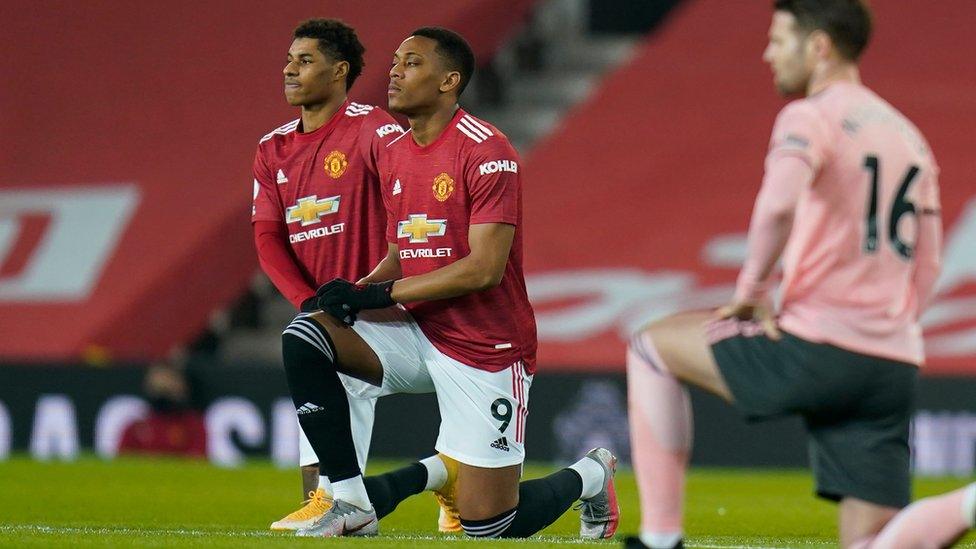
Manchester United players Marcus Rashford (left) and Anthony Martial (centre) take a knee in protest against racism. Players across the Premier League have been taking a knee before games since last Spring, in response to the Black Lives Matter movement. Both Rashford and Martial have experienced racial abuse on social media
Earlier this month, Manchester United, Manchester City, Liverpool and Everton issued a joint statement against the racist abuse players are facing: "We stand shoulder to shoulder in saying there is no room for racism, hate or any form of discrimination in our beautiful game. It should not happen and it must stop".
The Premier League said social media companies "need to do more" and want "swifter removal of offensive messages and improved identification and banning of offenders".
After Anthony Martial was abused on Sunday, Manchester United said their position remained unchanged from a statement issued at the end of January, when they said they were "disgusted" at the abuse and urged social media platforms and regulatory authorities "to strengthen measures to prevent this kind of behaviour".
What is being done to tackle the issue?
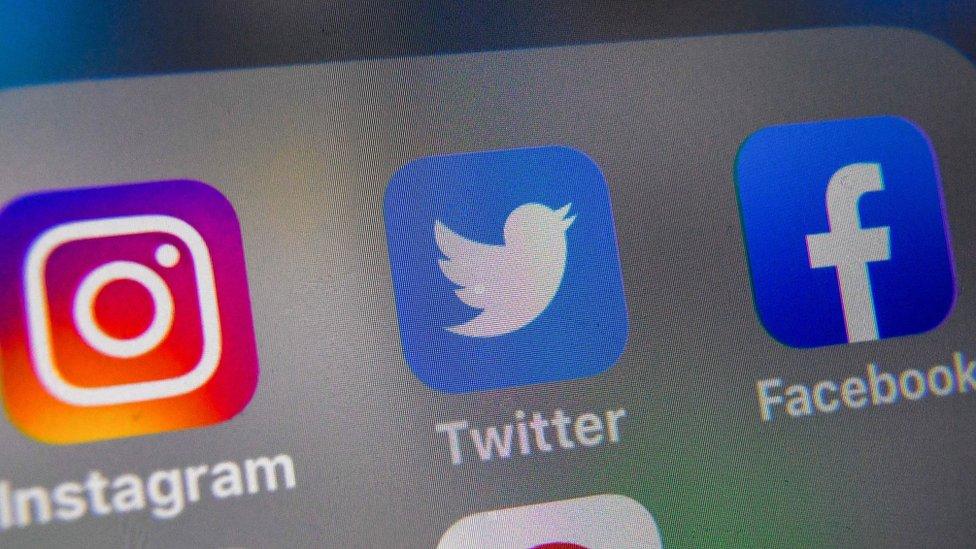
Social media companies are being asked to do more to stop hate crime on their platforms
The Football Association (FA), the police, and social media companies are under pressure to stamp racism out of the game for good.
Both Facebook and Twitter say they are acting to removing abuse on their platforms.
Facebook said in a recent statement: "There is no place for racism on Instagram and we are committed to removing it when we find it."
Twitter's statement said: "Racist behaviour has no place on our service and when we identify accounts that violate any of the Twitter Rules, we take enforcement action.
"We have proactively engaged and continue to collaborate with our valued partners in football to identify ways to tackle this issue collectively and will continue to play our part in curbing this unacceptable behaviour - both online and offline."
Facebook recently announced that they will impose stricter penalties on accounts which repeatedly send abusive direct messages on Instagram.
"If someone repeatedly sends DMs that break our rules, we will disable their account," a Facebook spokesperson told Newsround.
"We know there is more to be done and we will continue to work with the clubs, players and wider industry to collectively tackle this issue."
Facebook also says it is working with Kick It Out - a charity which promotes equality in football - on a fans' education and reporting initiative, and has built tools designed to prevent unwanted contact on Instagram. The tech companies argue that tackling this problem is not as straightforward as many assume.
However, some people think the platforms are not doing enough and are calling for social media companies to ask users to provide formal identification, such as a passport or driving licence, to sign up to the platform. It's thought this will make it easier for police forces to find out who is committing hate crimes and discourage people from posting abuse too.
Facebook said the company was "horrified" by the abuse but said calls for users to all have to validate their accounts with documentation are not possible as access to such documents is not straightforward in some countries.
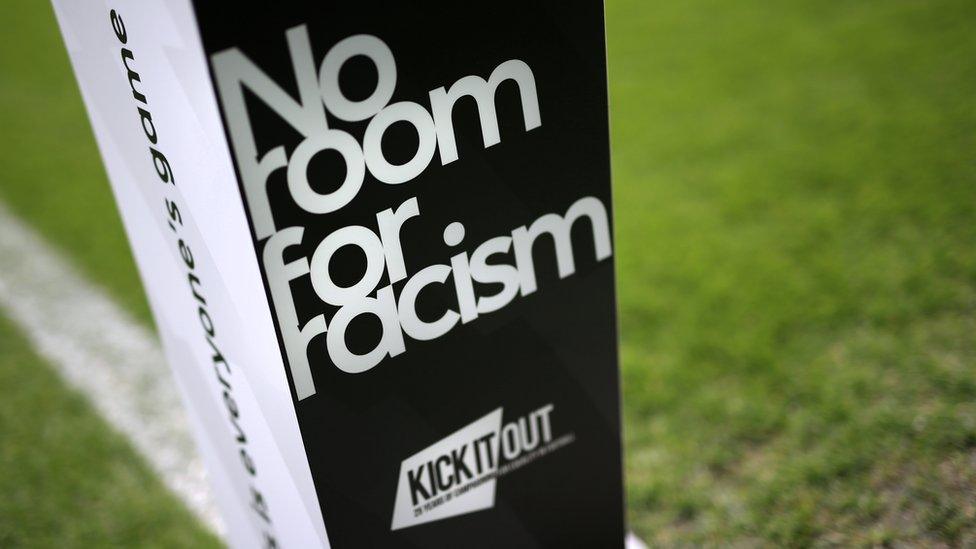
Kick It Out anti-racism adverts used at Premier League matches in 2019
The Football Association - football's governing body - is also under a lot of pressure to address the problem at all levels of the game.
It has called for action from the government, which has since announced it plans to bring in new laws to make tech companies legally responsible for their users online safety. These new laws could mean that social media companies could face "large fines" potentially amounting to "billions of pounds" if they fail to tackle abuse on their platforms.
Kick It Out works with the people in charge of football (the Football Association and County Football Associations) to try to stamp out racism and make football fairer and more inclusive. The charity's chief executive Sanjay Bhandari told the BBC that "hope is on the horizon" because the government is starting to address the issue, "but that may not come quickly enough so there's things we need social media to do right now.
"The behavioural, cultural problems will take longer to solve. It's the technology problem we can do more quickly and all of the answers sit with Twitter and Facebook. Technology has been massively unregulated for 25 years and its time we closed that loophole", he added.
What did the police tell us?
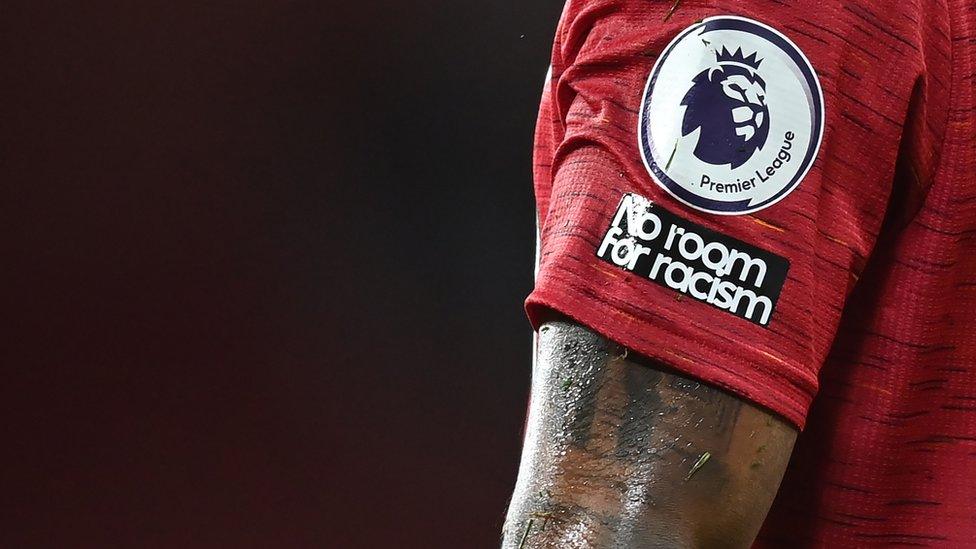
No room for racism badges feature on premier league players' shirts
Newsround asked Deputy Chief Constable Mark Roberts, National Police Chiefs' Council Football Policing Lead, for comment. He said: "All reports of racist abuse, whether online or in stadiums, are taken incredibly seriously. This can be seen from the increase in arrests despite a curtailed season.
"Where we can get evidence, police will take action, however it is not uncommon to encounter difficulties with social media companies who can be reluctant, or slow at providing detail.
"We need to see a robust commitment to proactively secure and provide the evidence police need to identify the perpetrators of this appalling behaviour.
"We recognise the distress this abuse causes people, and we will continue to work with players, the Professional Footballers' Association and relevant bodies to support victims of crime. It is hoped this support will give them the confidence to see the process through, to bring these offenders to justice."
- Published11 September 2019
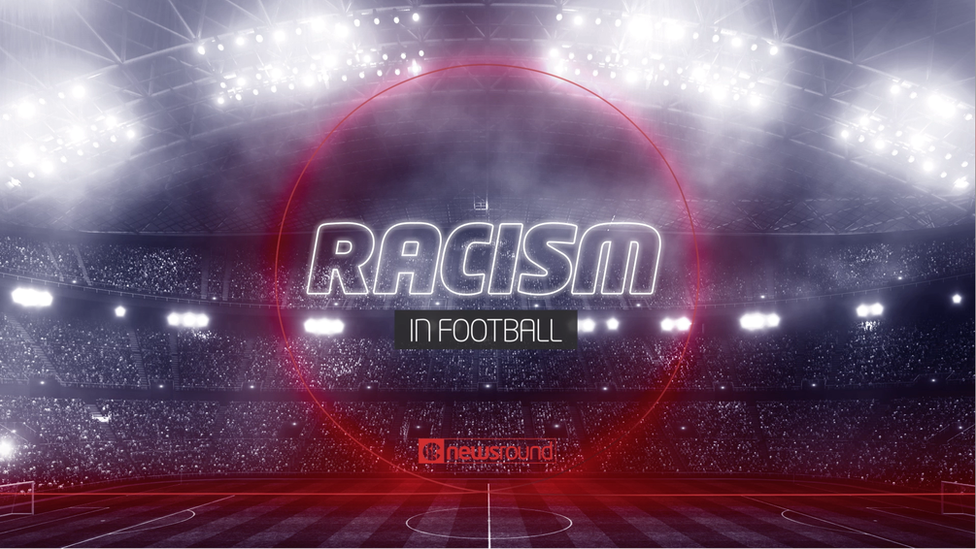
- Published14 September 2019
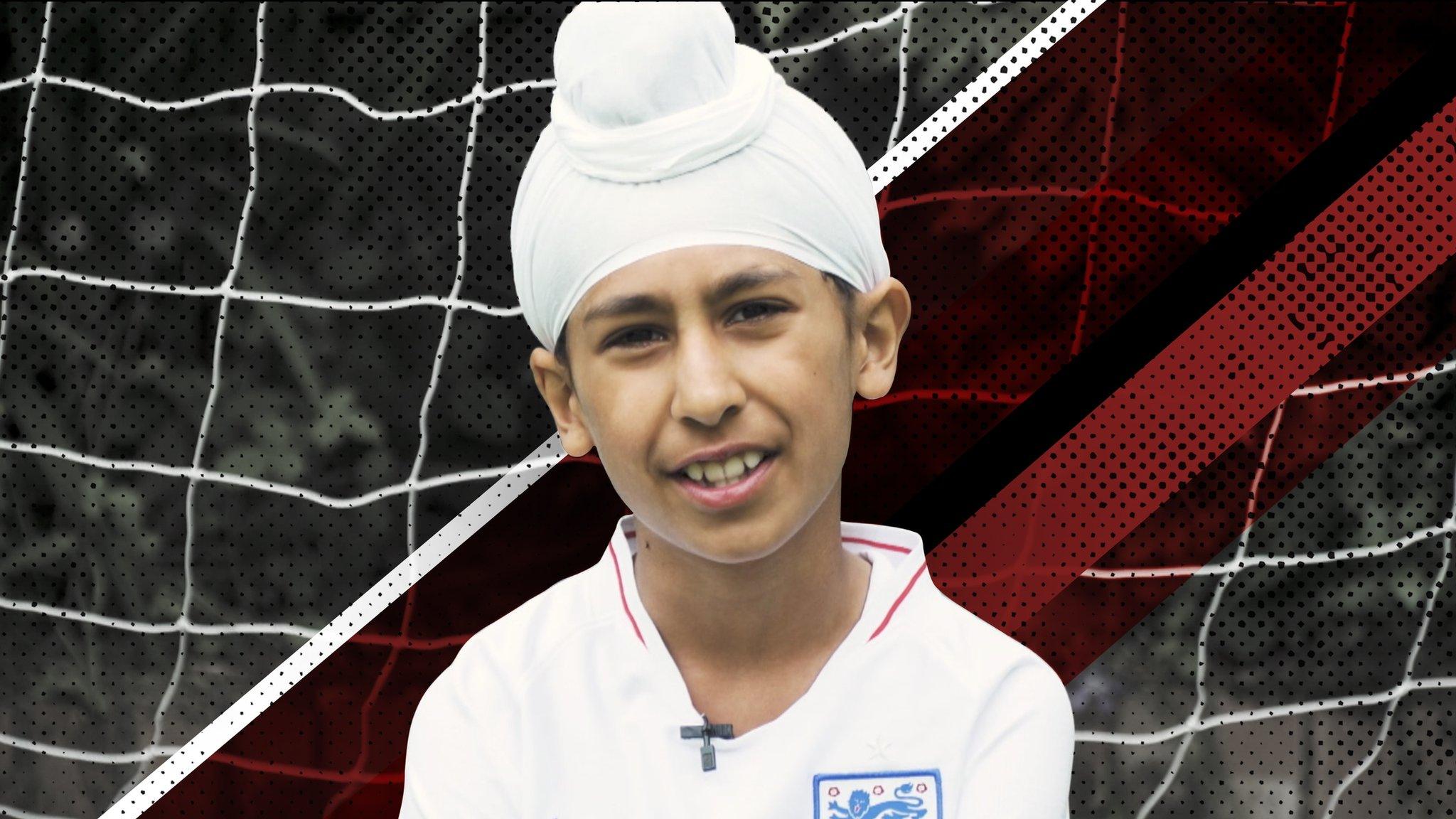
- Published29 November 2018
